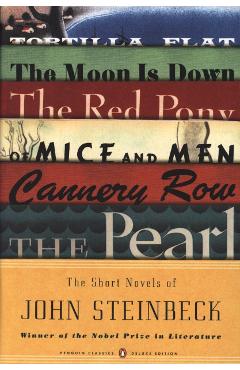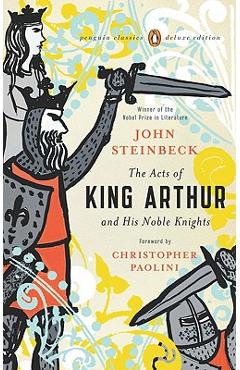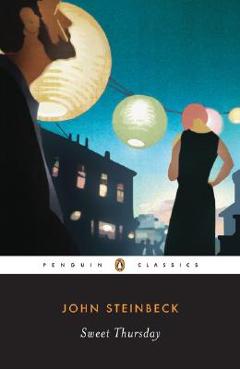Cannery Row: (Centennial Edition) - John Steinbeck

Detalii Cannery Row: (Centennial Edition) -
libris.ro
100.44 Lei
111.6 Lei
Fiction
John Steinbeck
Cannery Row: (Centennial Edition) - - Disponibil la libris.ro
Pe YEO găsești Cannery Row: (Centennial Edition) - de la John Steinbeck, în categoria Fiction.
Indiferent de nevoile tale, Cannery Row: (Centennial Edition) - John Steinbeck din categoria Fiction îți poate aduce un echilibru perfect între calitate și preț, cu avantaje practice și moderne.
Preț: 100.44 Lei
Caracteristicile produsului Cannery Row: (Centennial Edition) -
Comandă Cannery Row: (Centennial Edition) - Online, Simplu și Rapid
Prin intermediul platformei YEO, poți comanda Cannery Row: (Centennial Edition) - de la libris.ro rapid și în siguranță. Bucură-te de o experiență de cumpărături online optimizată și descoperă cele mai bune oferte actualizate constant.
Descriere magazin:
Drawing characters based on his memories of real inhabitants of Monterey, Steinbeck interweaves the stories of Doc, Henri, Mack, and his boys, in a world where only the fittest survive, in a novel that focuses on the acceptance of life as it is--a story at once humorous and poignant. Steinbeck\'s tough yet charming portrait of people on the margins of society, dependant on one another for both physical and emotional survival Unburdened by the material necessities of the more fortunate, the denizens of Cannery Row discover rewards unknown in more traditional society. Henry the painter sorts through junk lots for pieces of wood to incorporate into the boat he is building, while the girls from Dora Flood\'s bordello venture out now and then to enjoy a bit of sunshine. Lee Chong stocks his grocery with almost anything a man could want, and Doc, a young marine biologist who ministers to sick puppies and unhappy souls, unexpectedly finds true love. Cannery Row is just a few blocks long, but the story it harbors is suffused with warmth, understanding, and a great fund of human values. First published in 1945, Cannery Row focuses on the acceptance of life as it is--both the exuberance of community and the loneliness of the individual. John Steinbeck draws on his memories of the real inhabitants of Monterey, California, and interweaves their stories in this world where only the fittest survive--creating what is at once one of his most humorous and poignant works. In Cannery Row , John Steinbeck returns to the setting of Tortilla Flat to create another evocative portrait of life as it is lived by those who unabashedly put the highest value on the intangibles--human warmth, camaraderie, and love. This Steinbeck Centennial Edition features French flaps and deckled pages. For more than sixty-five years, Penguin has been the leading publisher of classic literature in the English-speaking world. With more than 1,500 titles, Penguin Classics represents a global bookshelf of the best works throughout history and across genres and disciplines. Readers trust the series to provide authoritative texts enhanced by introductions and notes by distinguished scholars and contemporary authors, as well as up-to-date translations by award-winning translators.

Produse asemănătoare
Produse marca John Steinbeck

Short Novels of John Steinbeck (Penguin Classics Deluxe Edit - John Steinbeck
![]() libris.ro
libris.ro
Actualizat in 28/10/2025
189.72 Lei

The Acts of King Arthur and His Noble Knights: (penguin Classics Deluxe Edition) - John Steinbeck
![]() libris.ro
libris.ro
Actualizat in 28/10/2025
134.64 Lei


